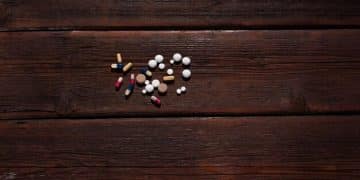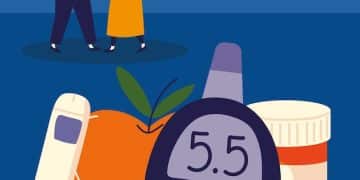Medication Side Effects on Male Sexual Function: A Comprehensive Guide

Many common medications, including antihypertensives, antidepressants, and antihistamines, can significantly impact male sexual function by affecting libido, erectile function, and ejaculation, necessitating patient awareness and physician consultation for management.
For many men, understanding what are the potential side effects of common medications on male sexual function is crucial, yet often overlooked. Prescribed drugs, while essential for treating various health conditions, can sometimes interfere with intimate aspects of life, leading to distress and impacting overall well-being. This comprehensive guide delves into how widely used medications can affect male libido, erectile function, and ejaculation, offering insights into recognizing these effects and encouraging open dialogue with healthcare providers.
Understanding the Complex Interplay of Medications and Sexual Health
The human body is an intricate system, and introducing external chemicals, even therapeutic ones, can create ripple effects that extend beyond the intended target. Sexual function, in particular, relies on a delicate balance of hormonal, neurological, and psychological factors. When a medication disrupts any of these pathways, the consequences can manifest as diminished libido, difficulty with erections, or issues with ejaculation. It’s a nuanced area where individual responses can vary significantly, making a one-size-fits-all diagnosis challenging.
Many patients are prescribed medications without a full understanding of their potential sexual side effects. This lack of awareness can lead to frustration, anxiety, and even non-adherence to vital treatments. Our aim here is to bridge that knowledge gap, providing clarity on which classes of drugs are most commonly implicated and why. By empowering individuals with this information, we hope to foster proactive discussions with healthcare providers, ultimately leading to better health outcomes and improved quality of life.
Antihypertensives: Blood Pressure and Sexual Performance
Hypertension, or high blood pressure, is a pervasive health issue, and antihypertensive medications are among the most commonly prescribed drugs globally. While essential for preventing serious cardiovascular events, several classes within this group can significantly impact male sexual function. The mechanisms vary, but often involve altering blood flow, affecting nerve signals, or influencing hormone levels. Patients might experience changes in libido, difficulty
achieving or maintaining an erection, or even ejaculatory problems. It’s a delicate balance between managing a life-threatening condition and preserving an important aspect of quality of life.
Beta-Blockers and Sexual Dysfunction
Beta-blockers, such as atenolol, metoprolol, and propranolol, are effective in lowering blood pressure and managing heart conditions. However, they are frequently cited for their potential to cause sexual side effects. These drugs work by blocking adrenaline’s effects, which can lead to reduced blood flow to the penis and diminished sympathetic nervous system activity essential for arousal and erection. The impact can range from mild to severe, affecting a significant number of male patients on these medications.
- Reduced libido or sex drive.
- Difficulty achieving or maintaining an erection.
- Ejaculatory dysfunction, including delayed or retrograde ejaculation.
While newer, more selective beta-blockers might have a lesser impact, the risk still exists. It’s important for patients to discuss these concerns with their doctor, as alternative treatments or dosage adjustments may alleviate these issues without compromising blood pressure control.
Diuretics: More Than Just Water Pills
Diuretics, particularly thiazide diuretics like hydrochlorothiazide, are often the first line of defense against high blood pressure. While effective, they can also contribute to erectile dysfunction (ED). The primary mechanism is thought to be a reduction in total body water and blood volume, which can lead to decreased blood flow required for an erection. Additionally, some diuretics can affect potassium and magnesium levels, potentially influencing muscle function and nerve signals in ways that impair sexual response.
The impact of diuretics on sexual health is less frequent and generally less severe than that of beta-blockers, but it’s a consideration nonetheless. Understanding that even “simple” water pills can have such nuances is vital for both patients and healthcare providers. Often, a change in medication class or combination therapy can mitigate these side effects while maintaining therapeutic benefits.

Antidepressants and the Sexual Toll
Depression affects millions worldwide, and antidepressant medications are a cornerstone of treatment. While pivotal for mental well-being, many commonly prescribed antidepressants are notorious for their sexual side effects. These effects are often among the most bothersome for patients and can lead to non-adherence, highlighting the critical need for awareness and management strategies. The primary culprits are typically selective serotonin reuptake inhibitors (SSRIs), but other classes can also play a role.
SSRIs: A Common Culprit in Sexual Dysfunction
Selective serotonin reuptake inhibitors (SSRIs) such as fluoxetine (Prozac), sertraline (Zoloft), paroxetine (Paxil), and escitalopram (Lexapro) are widely prescribed for depression, anxiety disorders, and other mental health conditions. While effective in modulating mood, they exert their effects by increasing serotonin levels in the brain. This increase can unfortunately lead to several sexual dysfunctions. Serotonin plays a complex role in sexual response, and an excess can inhibit various stages of the sexual cycle.
- Decreased libido or complete loss of sexual desire.
- Delayed or absent orgasm (anorgasmia), which can be particularly distressing.
- Erectile dysfunction, making it difficult to achieve or maintain an erection.
- Reduced genital sensation.
These side effects are common, affecting a significant percentage of patients on SSRIs, sometimes even after discontinuing the medication in a condition known as Post-SSRI Sexual Dysfunction (PSSD). Open communication with a psychiatrist is paramount, as dosage adjustments, switching to a different antidepressant with a lower sexual side effect profile (like bupropion), or adding a medication to counteract these effects may be options.
Other Antidepressants and Atypical Cases
Beyond SSRIs, other classes of antidepressants can also impact sexual function, albeit sometimes through different mechanisms or with varying incidence rates. Tricyclic Antidepressants (TCAs) like amitriptyline and imipramine can cause sexual side effects, including ED and ejaculatory problems, due to their anticholinergic and alpha-adrenergic blocking properties. While less commonly prescribed as first-line antidepressants today, they are still used for certain conditions.
Atypical antidepressants, a diverse group, present a mixed bag. Bupropion (Wellbutrin) is often noted for a lower incidence of sexual side effects compared to SSRIs; in some cases, it can even improve libido because it acts primarily on dopamine and norepinephrine. Mirtazapine (Remeron) generally has fewer sexual side effects than SSRIs. Conversely, venlafaxine (Effexor), a serotonin-norepinephrine reuptake inhibitor (SNRI), shares many sexual side effects with SSRIs due to its serotonergic action.
The complexity of antidepressant-induced sexual dysfunction underscores the need for personalized medicine. What affects one individual might not affect another similarly. A thorough discussion with a prescribing physician is essential to weigh the benefits of mental health treatment against the potential compromises to sexual quality of life.
Antihistamines and Sedatives: Underestimated Impacts
Many people take antihistamines for allergies or common cold symptoms, and sedatives for insomnia or anxiety, often without considering their broader systemic effects. While generally well-tolerated, some of these medications can indeed have an underestimated impact on male sexual function. Their mechanisms typically involve affecting neurotransmitter systems that are also crucial for sexual arousal and response. The effects might be subtle but can accumulate, particularly with chronic use or higher doses.
First-Generation Antihistamines and Anticholinergic Effects
First-generation antihistamines, such as diphenhydramine (Benadryl) and chlorpheniramine, are known for their sedative properties and significant anticholinergic effects. These anticholinergic actions can interfere with the parasympathetic nervous system, which plays a vital role in achieving erections. By blocking acetylcholine, a key neurotransmitter involved in vasodilation and muscle relaxation necessary for penile engorgement, these drugs can lead to:
- Difficulty achieving or maintaining an erection.
- Reduced libido.
- Dryness, which can indirectly impact sexual comfort.
Newer, second-generation antihistamines (like loratadine or cetirizine) have fewer anticholinergic properties and are less likely to cause these sexual side effects, making them a preferred choice for individuals concerned about this issue. However, over-the-counter availability of first-generation drugs means many might be unknowingly experiencing these side effects.
Sedatives and Anxiolytics: General CNS Depression
Medications used for sedation, such as benzodiazepines (e.g., diazepam, alprazolam) and some sleeping aids, primarily work by depressing the central nervous system (CNS). While this helps alleviate anxiety or induce sleep, general CNS depression can also dampen sexual desire and response. Sexual function requires a certain level of CNS activation and responsiveness, and excessive sedation can directly interfere with this.
The effects typically include
a reduced libido and difficulty achieving orgasm. In some cases, erectile function can also be subtly impaired due to the overall dampening of physiological responses. The challenge lies in balancing the need for anxiety reduction or sleep with preserving sexual expression. Discussing these concerns with a doctor can lead to exploring alternative medications or non-pharmacological therapies that may have fewer sexual contraindications.
Gastrointestinal Medications: Unexpected Links
It might seem counterintuitive, but certain medications used to treat gastrointestinal conditions can also impact male sexual function. The link often involves their influence on hormone levels, particularly prolactin, or through other systemic effects. While not as widely recognized as antihypertensives or antidepressants for their sexual side effects, it’s an important area for awareness, especially given the prevalence of GI issues.
H2-Blockers and Prolactin Levels
Some H2-receptor blockers, particularly cimetidine (Tagamet), which were once widely used to treat heartburn and ulcers, are known to have antiandrogenic effects and can increase prolactin levels. Elevated prolactin can suppress testosterone production and directly inhibit sexual desire and function. This can lead to:
- Decreased libido.
- Erectile dysfunction.
- In rare cases, gynecomastia (breast enlargement in men) due to hormonal imbalance.
Newer H2-blockers (like ranitidine, famotidine) and proton pump inhibitors (PPIs) generally have a lower incidence of these side effects, making them a safer alternative concerning sexual health. However, historic use and individual sensitivities mean this remains a relevant consideration. Pharmacists advising on over-the-counter options should be aware of these potential interactions.
Opioids: Potent Pain Relief, Potent Sexual Impact
Opioid pain medications, while not primarily gastrointestinal drugs, are often associated with constipation, a GI side effect. More critically, for sexual health, chronic opioid use, especially at higher doses, is strongly linked to opioid-induced androgen deficiency (OPIAD). Opioids can suppress the hypothalamic-pituitary-gonadal axis, leading to significantly reduced testosterone levels. This hormonal disruption can profoundly affect male sexual function, causing:
- Severe decrease in libido.
- Significant erectile dysfunction.
- Reduced energy and general well-being, compounding sexual issues.
Managing chronic pain while preserving sexual health is a complex challenge when opioids are involved. Patients and doctors should discuss testosterone levels and potential testosterone replacement therapy if OPIAD is diagnosed. Exploring alternative pain management strategies that do not involve chronic opioid use is also crucial.
Other Medication Classes and Their Sexual Footprint
Beyond the major categories, several other types of medications, often for specific or serious conditions, carry a potential sexual footprint. Understanding these less common but significant interactions ensures a comprehensive approach to sexual health assessment. These drugs often operate through hormonal pathways or have broad systemic effects that indirectly influence sexual response.
Antiandrogens and Hormonal Therapies
Medications specifically designed to reduce androgen (male hormone) levels are inherently impactful on male sexual function. Drugs used for prostate cancer, such as LHRH agonists (e.g., leuprolide) or antiandrogens (e.g., bicalutamide), aim to suppress testosterone to slow cancer growth. The expected side effects are significant and include:
- Profound loss of libido.
- Severe erectile dysfunction.
- Shrinkage of testicles and breast enlargement.
Similarly, finasteride and dutasteride, used for benign prostatic hyperplasia (BPH) and male pattern baldness, work by inhibiting the conversion of testosterone to dihydrotestosterone (DHT). While effective for their primary indications, they can cause sexual side effects, including decreased libido, ED, and ejaculatory problems, though the severity varies among individuals. A condition known as Post-Finasteride Syndrome (PFS) describes persistent sexual side effects even after discontinuing the drug, highlighting the long-term impact for some.
Statins: Cholesterol Management and Contention
Statins, widely prescribed to lower cholesterol, have been a subject of debate regarding their impact on sexual function. While some studies initially suggested a negative effect on testosterone or erectile function, likely due to cholesterol being a precursor to steroid hormones, subsequent research has yielded mixed results. Some studies even suggest statins might improve erectile function in certain cardiovascular patients due to better endothelial function.
However, a small percentage of individuals may still report sexual side effects. These are typically mild and include:
- Slight decrease in libido.
- Mild erectile difficulties.
The evidence is not as robust as for other drug classes, and the cardiovascular benefits of statins far outweigh the potential, often mild, sexual side effects for most patients. Any concerns should be discussed with a doctor, as adjusting the type or dose of statin might be considered if other causes are ruled out.
Anticonvulsants and Mood Stabilizers
Certain anticonvulsant medications (used for epilepsy and neuropathic pain) and mood stabilizers (for bipolar disorder) can also affect sexual function. Drugs like carbamazepine and valproate have been associated with decreased libido and erectile dysfunction, possibly by altering hormone levels or affecting neurotransmitter balance. Topiramate, another anticonvulsant, can cause a range of sexual side effects. Psychiatric medications, specifically antipsychotics, are commonly linked to sexual dysfunction through elevated prolactin levels or anticholinergic effects. Individuals on these medications often face a challenging diagnostic landscape, where their underlying condition, the medication, and other lifestyle factors all contribute to their sexual health.
Navigating the Conversation: What to Do
Understanding the potential side effects is only the first step. The critical part is knowing how to address them effectively. The prospect of discussing sexual problems with a healthcare provider can be daunting, but it is an essential conversation for maintaining both physical and emotional well-being. Proactive communication and a collaborative approach are key to finding solutions that work for you.
Open Dialogue with Your Healthcare Provider
Never self-diagnose or abruptly stop medications without medical advice. If you suspect a medication is impacting your sexual function, schedule an appointment with your doctor. Be prepared to discuss:
- The specific sexual symptoms you are experiencing (e.g., changes in libido, erectile difficulty, ejaculatory issues).
- When these symptoms started in relation to starting the medication.
- The impact these symptoms are having on your quality of life.
Your doctor can help determine if the medication is indeed the cause or if other factors, such as underlying health conditions (e.g., diabetes, heart disease), psychological stress, or lifestyle choices, are contributing. They might also perform physical examinations or blood tests to check hormone levels (like testosterone and prolactin) to provide a more complete picture.
Potential Solutions and Management Strategies
Once the medication linkage is established, several strategies may be explored. These should always be decided in consultation with your doctor:
- Dosage Adjustment: Sometimes, a lower dose of the same medication can reduce side effects while retaining therapeutic benefits.
- Switching Medications: Your doctor might suggest switching to a different medication within the same class that has a lower propensity for sexual side effects, or to an entirely different class of drug for your condition. For example, switching from an SSRI to bupropion for depression.
- Adding a Counteracting Medication: In some cases, a doctor might prescribe an additional medication to counteract the sexual side effects. For instance, a PDE5 inhibitor (like sildenafil or tadalafil) for erectile dysfunction in men on certain antidepressants.
- Timed Dosing: For medications with a short half-life, adjusting the timing of the dose (e.g., taking it after sexual activity) might be a viable option, though this is less common.
- Hormone Therapy: If a medication has significantly lowered testosterone levels, testosterone replacement therapy might be considered, under careful medical supervision due to its own set of risks and benefits.
- Lifestyle Modifications: While not a direct solution for medication-induced side effects, adopting healthy lifestyle habits (regular exercise, balanced diet, stress management, avoiding excessive alcohol and smoking) can improve overall sexual health and potentially mitigate some side effects.
- Psychological Support: Sexual dysfunction, regardless of its cause, can have significant psychological impacts. Counseling or sex therapy can help individuals and couples cope with the changes and explore strategies for maintaining intimacy.
The journey to finding the right balance between managing a health condition and preserving sexual well-being is often a collaborative one. It requires patience, open communication, and a willingness to explore different avenues with your healthcare team. Remember, your sexual health is an integral part of your overall quality of life, and addressing concerns proactively is always the best approach.
| Key Point | Brief Description |
|---|---|
| 💊 Medication Impact | Common drugs for hypertension, depression, and other conditions can significantly affect male sexual function. |
| 🗣️ Open Communication | Discuss any sexual side effects openly with your doctor; never stop medication abruptly. |
| 🔄 Potential Solutions | Solutions may involve dosage adjustment, changing medications, or adding complementary therapies. |
| 🔬 Hormonal Balance | Some medications can alter hormone levels, leading to reduced libido or erectile dysfunction. |
Frequently Asked Questions About Medication Side Effects on Male Sexual Function
While some blood pressure medications, particularly beta-blockers and certain diuretics, can cause temporary erectile dysfunction (ED), it is usually reversible upon dose adjustment or switching to an alternative medication. Permanent ED directly caused by these drugs is rare; cessation or change in medication often resolves the issue, though underlying cardiovascular health may contribute.
No, not all antidepressants affect male sexual function equally. Selective serotonin reuptake inhibitors (SSRIs) are most commonly associated with sexual side effects like decreased libido and delayed orgasm. However, atypical antidepressants like bupropion generally have a lower incidence of these issues, and might even sometimes improve sexual function. Discussion with a doctor can help find the right balance.
The onset of sexual side effects can vary. For some medications, particularly those affecting neurotransmitters (like antidepressants), effects might appear within days to weeks of starting treatment or increasing the dose. For others, such as some hormonal therapies, the changes might be more gradual, becoming noticeable over several weeks or months. Prompt reporting to your doctor is crucial.
Post-SSRI Sexual Dysfunction (PSSD) is a challenging condition where sexual side effects, such as reduced libido, anorgasmia, or genital anesthesia, persist even after discontinuing antidepressant medication. Its exact mechanisms are not fully understood, and effective treatments are still under investigation. Awareness and careful monitoring of sexual symptoms during and after SSRI use are important.
Yes, some over-the-counter (OTC) medications can affect male sexual function. First-generation antihistamines (like diphenhydramine) are known for their anticholinergic effects, which can lead to erectile dysfunction and reduced libido. Certain cold and flu medications containing decongestants may also potentially impact sexual response by constricting blood vessels. Always check labels and consult a pharmacist if unsure.
Conclusion
Understanding what are the potential side effects of common medications on male sexual function is not merely an academic exercise; it’s a critical component of holistic healthcare. From the widely used antihypertensives and antidepressants to less obvious culprits like certain antihistamines and GI medications, the impact on libido, erectile function, and ejaculation can be significant and distressing. Recognizing these links empowers men to engage in informed dialogue with their healthcare providers, ensuring that necessary medical treatments do not inadvertently compromise an essential aspect of their well-being. Proactive communication, combined with a willingness to explore alternative treatments or management strategies, is key to navigating these challenges effectively and preserving a healthy, fulfilling sexual life.





